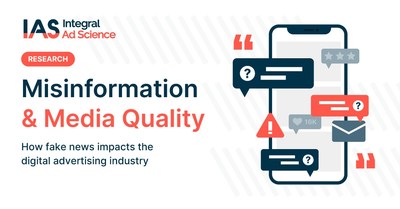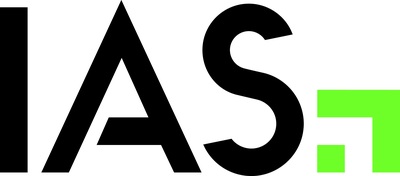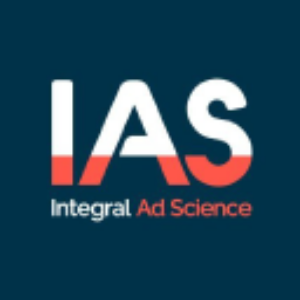New IAS Report Uncovers How Misleading Content Impacts Digital Advertising
Integral Ad Science (Nasdaq: IAS) has released a significant report titled 'Misinformation & Media Quality', revealing the challenges that misinformation presents in digital advertising. Conducted with over 500 experts, the study highlights that 73% agree on avoiding misinformation, yet only 47% have clear organizational guidelines. As ad spending is projected to reach $350 billion in 2022, the impact of misinformation is critical, with $235 million inadvertently spent on disinformation sites annually. The report underscores increasing concern over media quality threats, particularly misinformation.
- 73% of media experts agree on avoiding misinformation, indicating awareness.
- Collaboration with Global Disinformation Index enhances misinformation protection.
- Only 47% of organizations have clear guidelines on advertising with misinformation.
- Less than one-third effectively use context-based avoidance strategies, risking campaign effectiveness.
New research reveals the industry's lack of "clear guidelines" regarding advertising alongside misinformation
NEW YORK, June 6, 2022 /PRNewswire/ -- Integral Ad Science (Nasdaq: IAS), a global leader in digital media quality, today released its "Misinformation & Media Quality" report that uncovers how false information affects the digital advertising industry. The report of digital media experts explores the challenges that misleading content poses for media strategies, as well as what actions advertisers are taking to protect their campaigns against these growing threats.
"As we continue to classify sources of misinformation, our report illustrates the heightened need to focus on controlling advertisers' contextual adjacencies, including the implementation of suitability frameworks that specifically address false or misleading content," said Tony Marlow, CMO, IAS. "Coupled with our Global Disinformation Index (GDI) partnership, which provides advertisers with enhanced misinformation protection, this research reveals how industry leaders are grappling with misleading content and what actions they are, or aren't, taking to protect both current and future campaigns."
IAS, in partnership with YouGov, surveyed over 500 digital media experts from brands, agencies, publishers and adtech providers to examine perspectives surrounding misinformation, disinformation, and fake news. The research revealed the following trends:
A Vast Majority of Media Experts Agree Misinformation Should be Actively Avoided, But Few Say Their Organizations Have Clear Guidelines
The majority of media experts (
Despite its impact in diminishing audience reach and advertising opportunities, broad blocking is most commonly used by industry experts to avoid misleading content. Nearly half of media experts (
Context-based strategies, which allow ad buyers and sellers to avoid misinformation with minimal impact on reach, are underused. Less than one-third (
Recent Global Events Have Fueled the Threat of Misinformation, Disinformation, and Fake News Content
As ad spending continues to grow, total media ad spend is expected to approach
The majority of experts agree that the spread of misinformation has been fueled by recent global developments. Media experts surveyed reported that the volume of misinformation has increased due to political polarization (
A Large Number of Industry Experts Report High Levels of Concern Regarding Media Threats
As ad spending grows, media quality threats will remain top of mind, with
Though digital media experts agree that the spread of misinformation is the most concerning media quality threat, apprehension persists around ad fraud, adjacencies next to questionable content (i.e. brand risk), and low viewability for more than half of respondents, according to the report.
Marketers and Brands Prioritize Social Platforms Even Though They Consider the Environment Vulnerable to Misinformation
The research shows that marketers are prioritizing social platforms. Almost half (
About Integral Ad Science
Integral Ad Science (IAS) is a global leader in digital media quality. IAS makes every impression count, ensuring that ads are viewable by real people, in safe and suitable environments, activating contextual targeting, and driving supply path optimization. Our mission is to be the global benchmark for trust and transparency in digital media quality for the world's leading brands, publishers, and platforms. We do this through data-driven technologies with actionable real-time signals and insight. Founded in 2009 and headquartered in New York, IAS works with thousands of top advertisers and premium publishers worldwide. For more information, visit integralads.com.
CONTACT: press@integralads.com
![]() View original content to download multimedia:https://www.prnewswire.com/news-releases/new-ias-report-uncovers-how-misleading-content-impacts-digital-advertising-301560428.html
View original content to download multimedia:https://www.prnewswire.com/news-releases/new-ias-report-uncovers-how-misleading-content-impacts-digital-advertising-301560428.html
SOURCE Integral Ad Science, Inc.
FAQ
What does the IAS report say about misinformation in digital advertising?
How much is expected to be spent on media advertising in 2022?
What are the financial implications of misinformation according to IAS?
What percentage of experts are concerned about misinformation?









